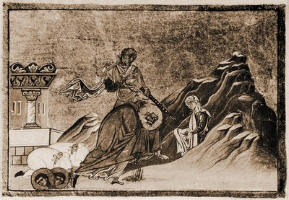
The Works Of Dionysius The Areopagite Volumes 1 & 2
SECTION III
Thus, then, the divine Bartholomew says that Theology is much and least, and the Gospel broad and great, and on the other hand concise. He seems to me to have comprehended this supernaturally, that the good Cause of all is both of much utterance, and at the same time of briefest utterance and without utterance; as having neither utterance nor conception, because It is superessentially exalted above all, and manifested without veil and in truth, to those alone who pass through both all things consecrated and pure, and ascend above every ascent of all holy summits, and leave behind all divine lights and sounds, and heavenly words, and enter into the gloom, where really is, as the Oracles say, He Who is beyond all. For even the divine Moses is himself strictly bidden to be first purified, and then to be separated from those who are not so, and after entire cleansing hears the many-voiced trumpets, and sees many lights, shedding pure and streaming rays; then he is separated from the multitude, and with the chosen priests goes first to the summit of the divine ascents, although even then he does not meet with Almighty God Himself, but views not Him (for He is viewless) but the place where He is. Now this I think signifies that the most Divine and Highest of the things seen and contemplated are a sort of suggestive expression of the things subject to Him Who is above all, through which His wholly inconceivable Presence is shown, reaching to the highest spiritual summits of His most holy places; and then he (Moses) is freed from them who are both seen and seeing, and enters into the gloom of the Agnosia; a gloom veritably mystic, within which he closes all perceptions of knowledge and enters into the altogether impalpable and unseen, being wholly of Him Who is beyond all, and of none, neither himself nor other; and by inactivity of all knowledge, united in his better part to the altogether Unknown, and by knowing nothing, knowing above mind.
Copyright ©1999-2023 Wildfire Fellowship, Inc all rights reserved

 Keep Site Running
Keep Site Running